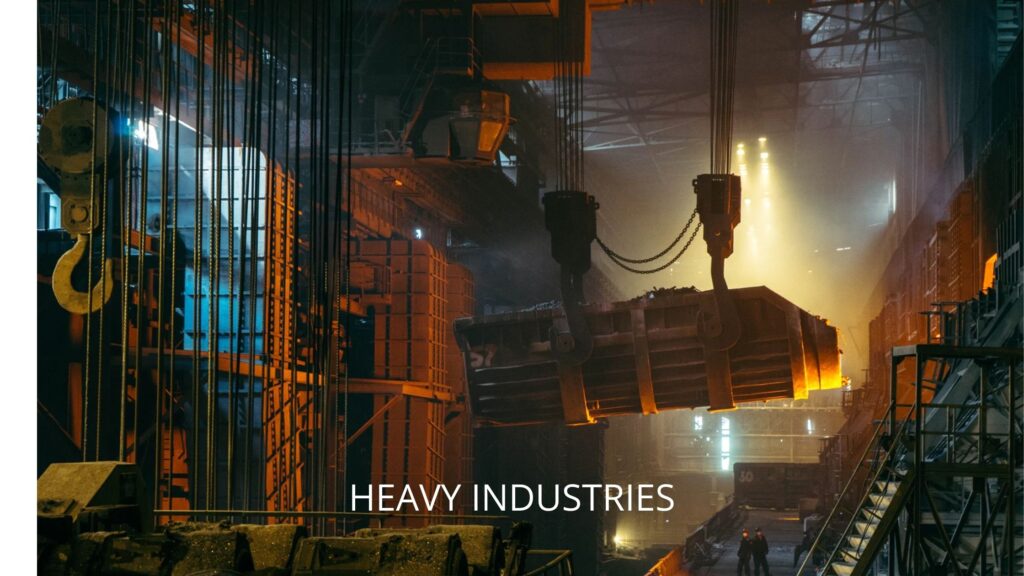Because heavy industry is capital intensive and necessitates major investment in heavy equipment, vast buildings, large machine tools, and extensive infrastructure, it is controlled by large corporations.
Heavy industry, as opposed to light industry, which is less capital intensive and sells to consumers, sells to huge purchasers such as enterprises, industries, and governments. It is also more cyclical in terms of both investment and employment. Also, you can check heavy industries business listing India to get more info about heavy industry businesses and how they operate.

Examples of Heavy Industry
Common examples of heavy industry include:
a. Aerospace
b. Shipbuilding
c. Mining
d. Machine tool building
e. Locomotive manufacturing
f. Oil and gas
g. Steel production
h. Chemical production
i. Construction of large buildings and infrastructure
Because of the Industrial Revolution, heavy industry and its associated manufacturing supply businesses have dominated the transport and construction industries.
Certain capital-intensive sectors, such as automobile manufacture, are not traditionally classified as heavy industry because their goods are primarily purchased by consumers.
Benefits of Heavy Industry
Millions of people worldwide are employed by heavy industry. Individual facilities may employ tens of thousands of people due to the vast size of manufacturing. Companies in the industry require a wide range of skills and occupations to run their operations. Heavy industry employs engineers, scientists, managerial employees, unskilled laborers, and a variety of other workers.
A lot of important inventions are also made by the heavy industry. Heavy industry is responsible for the creation of satellites, the exploration of space, the ease of worldwide travel, and the development of renewable energy technologies such as wind farms. Furthermore, it manufactures a large portion of the machinery and tools used in other areas of the economy.
Downsides of Heavy Industry
Heavy industry has a large environmental impact due to the nature of its products and manufacturing methods. It is responsible for around 22% of global greenhouse gas emissions and has other issues like as chemical leakage, oil spills, and excessive water use. Construction of the massive infrastructure needed for heavy industry may also result in the extinction of many animal species, including humans.
Heavy industry likewise necessitates large capital expenditure, resulting in high entry barriers. As a result, market power in most heavy sectors is concentrated in the hands of a few dominating businesses.
Good flow management is a necessity. Take the case of an automobile manufacturer. Before the car can be sold, many raw materials will go through transformation to make up every part of the car. It is necessary that these materials pass through different machines and different construction poles in order for the part to be completed and to be able to be mounted on the product under construction. For this, it is necessary to have installed belt conveyors to manage the transition between each machine.
There is therefore a lot of transport flow to manage within the company to supervise the delivery of parts. Whether for an SME or a large company, it is necessary to take into consideration this flow. Optimizing them saves time and money.
Heavy Industry in the World Economy
Because of government economic policies, heavy industry is an important aspect of the economy of many Asian countries. Because of the region’s diverse mineral resources, several metallurgical businesses, including steel and aluminum, are based in East Asia. China and Japan are the world’s two largest steel producers, while Japan and South Korea are famed for their aerospace and defense industries.
Heavy industry is also highly prominent in North America. Previously, the Canadian government provided billions of dollars in subsidies to Bombardier in order to help the firm construct its CSeries aircraft. Between 2000 and 2014, Boeing, one of the world’s major aerospace manufacturers and defense contractors, received millions in non-repayable federal subsidies as well as billions in federal loans and loan guarantees from the United States government.
The Future of Heavy Industry
Heavy industry will become the target of more strict environmental rules as more countries aim to achieve net-zero greenhouse gas emissions. It will increase the industry’s already high costs and may result in job losses in certain industries.
Nonetheless, demand for energy, building, mining, and other heavy industry will increase as the world’s population grows during the twenty-first century. Building environmentally friendly structures, introducing renewable energy plants such as solar farms and wind turbines, and implementing technological advancements in heavy industrial production processes are all part of the shift to a cleaner future. Heavy industry will become increasingly significant in the global economy, creating new opportunities.
Why you should consider Heavy Industries Business Listings?
Heavy Industries plays a very vital role in the evolution and innovation of products. So, before starting a business in this field, you should look and consult others who own this business. For this reason, you should check up on Heavy Industries Business Listings in India.
Now another important aspect which you should consider before opening a heavy industries business is checking on the heavy industries business listings. Here you can find thousands of other heavy industries business owners who have listed their business and therefore you can contact them to learn more about their business.
Best Heavy Industries Business Listing India Websites
Now we will give you a bunch of Heavy Industries Business Listing Websites for India where you can list your website to attain more reach. The below websites allow free listing.
- List My Businesses
- Whitepages
- Yellowbook
- Foursquare
- CitySlick
- Manta
- EZLocal
- Infignos
- Brownbook
- CitySquares
- YellowBot
Conclusion
Heavy Industries play a vital role in the evolution of mankind. It helps in creating millions of jobs and even in the evolution of technology. Power sources, windmills, solar energy, smart-buildings, renewable energy plants, etc. are some of the gifts that Heavy Industries have given to us. Moreover, in future, Heavy Industries would play a critical role in the global economy.